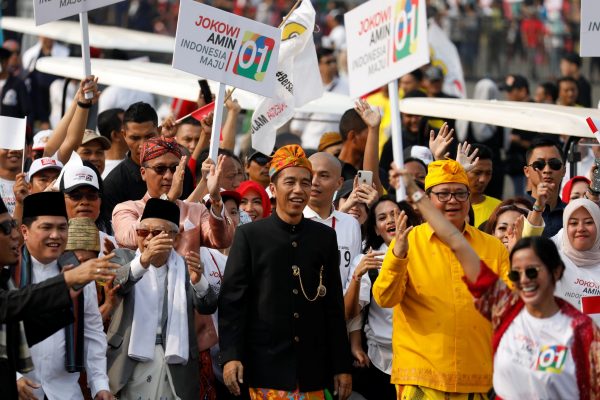Indonesian democratisation looks particularly robust from a comparative perspective. As of 2018, post-Suharto Indonesia has held four national parliamentary elections, three direct presidential elections and more than a thousand local elections. The rotation of elites through office has been peaceful and most Indonesians view the electoral process as fair and legitimate. Few citizens have been killed in direct connection to elections as they (especially journalists) have in the older democracy of the Philippines.
Indonesia’s press is relatively free and its party and electoral laws do not manipulate elections in favour of a certain party, as has been the case in neighbouring Malaysia. Electoral engineering there in favour of the United Malays National Organisation has been rampant and helped the party maintain parliamentary control from the 1950s when elections were first instituted until 2018 when the opposition won a stunning electoral victory. The domineering People’s Action Party’s has used similar tactics to win elections uninterruptedly in Singapore. Still a one-party authoritarian state, Vietnam does not even hold national-level elections. And in Thailand, the military continues to stage coups whenever it perceives political stalemates as insurmountable.
Myanmar’s military, in power since 1962, took the world by surprise when it initiated a transition toward democracy and transferred power to a civilian-led parliament in 2011. But Myanmar’s political liberalisation has exacerbated a virulent form of Buddhist nationalism that has resulted in the murder of thousands of Muslim Rohingyas and the forcible displacement of hundreds of thousands more from their home province in the country’s west.
Farther afield, Turkey had been celebrated as a model of Muslim democracy until its Islamist President, Recep Tayyip Erdogan, made a power grab as a result of a failed military coup in mid-2016. Post-Suharto Indonesia has also not experienced the sharp reversals that have plunged countries of the Arab Spring (except Tunisia) back into harsh authoritarianism.
The counterpoint to these observations is that by shifting from a comparative perspective to a country-specific vantage point, some of the lustre on Indonesia’s democracy is lost. State institutions, weakened by decades of overbearing interference and a crippling politicisation, are compromised and corruptible. This is especially so for those institutions tasked with upholding the rule of law. Inequality is on the rise, poverty alleviation too slow and the creation of jobs in the formal sector slower still. ‘Money politics’ infects elections and legislation-making at all government levels.
While the country’s multi-party system has proven more robust than that of the Philippines or Thailand, the system is cracking under the weight of corruption and the rise of vote buying. Although much of the bloodshed that marred Indonesia’s transition to democracy has waned, everyday security for too many Indonesians remains uncertain.
Decentralisation, designed to empower local communities, contributes to the country’s continuing corruption and to many incidents of collective violence. Local elites build their power by skimming off government transfers instead of by improving service delivery and development outcomes. And although the military no longer determines policy on most civilian matters, its informal power rightly worries advocates of civilian democracy.
The largest present threat to Indonesia’s democratic order is growing sectarianism. The two candidates vying for Indonesia’s fourth direct presidential election in April 2019 represent each side of Indonesia’s present divide. The incumbent, President Joko ‘Jokowi’ Widodo, leads the camp that champions pluralism. Jokowi’s challenger, Prabowo Subianto, a former Suharto-era general, heads the Islamist and militaristic side.
The 2019 contest will be a repeat of the 2014 contest, when Jokowi defeated Prabowo but by a closer margin than was predicted. Prabowo’s surprising showing, and developments since then, have lent political Islam resilience and legitimacy.
No longer marginal or marginalised, this movement is increasingly infiltrating and redefining Indonesia’s once tolerant Muslim majority. It is fostering an environment of intolerance that threatens religious and other minorities, while wrenching open searing fissures over national identity and citizenship. There is concern over the diminishing roles that civility, democratic pluralism and diversity play in Indonesian politics and society. Regrettably, a pressured Jokowi is fighting back by turning to repressive measures that recall authoritarian practices of yesteryear.
No matter the outcome of the 2019 election, Indonesia will remain polarised. Whether this polarisation overwhelms the country’s democratic order remains to be seen.
Jamie S Davidson is Associate Professor of Political Science at the National University of Singapore. He is the author of Indonesia: Twenty Years of Democracy (Cambridge University Press, 2018), from which this commentary draws.

